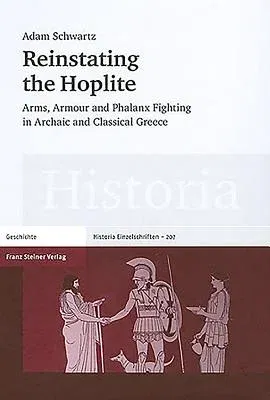Adam Schwartz
(Author)Reinstating the Hoplite: Arms, Armour and Phalanx Fighting in Archaic and Classical GreecePaperback, 5 April 2013

Qty
1
Turbo
Ships in 2 - 3 days
Only 2 left
Free Delivery
Cash on Delivery
15 Days
Free Returns
Secure Checkout

Part of Series
Historia - Einzelschriften
Print Length
337 pages
Language
English
Publisher
Franz Steiner Verlag Wiesbaden GmbH
Date Published
5 Apr 2013
ISBN-10
3515103988
ISBN-13
9783515103985
Description
Product Details
Author:
Book Format:
Paperback
Country of Origin:
US
Date Published:
5 April 2013
ISBN-10:
3515103988
ISBN-13:
9783515103985
Language:
English
Location:
Stuttgart
Pages:
337
Publisher:
Series: